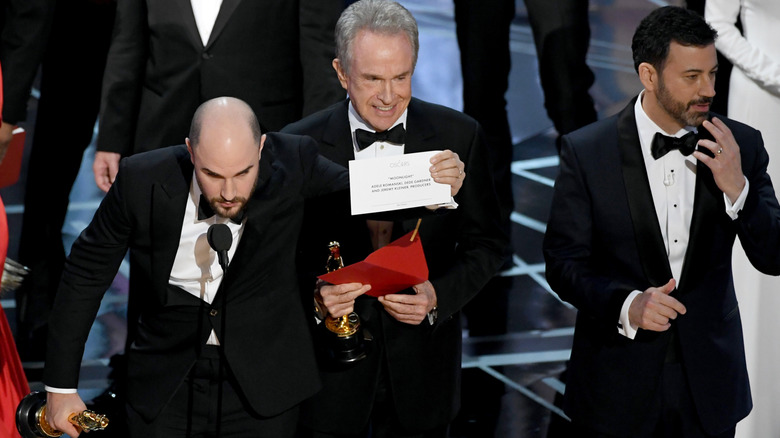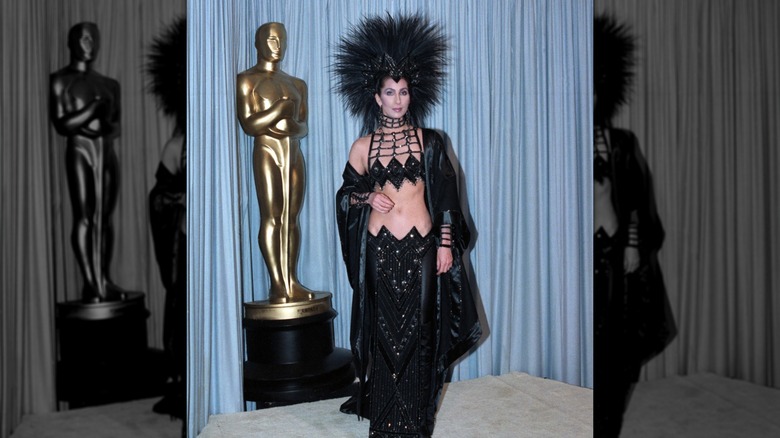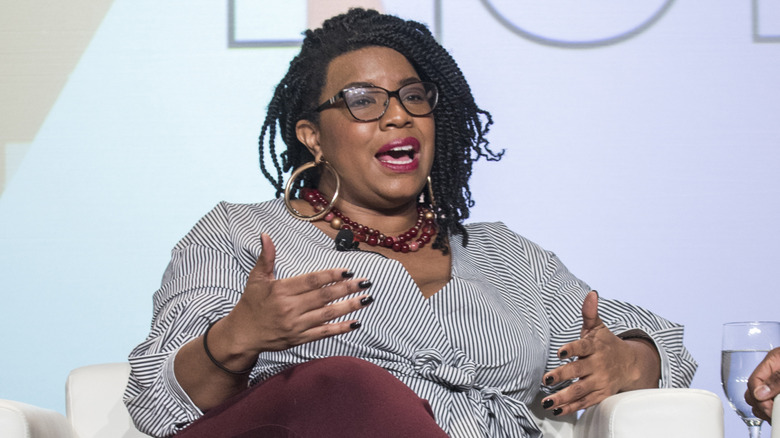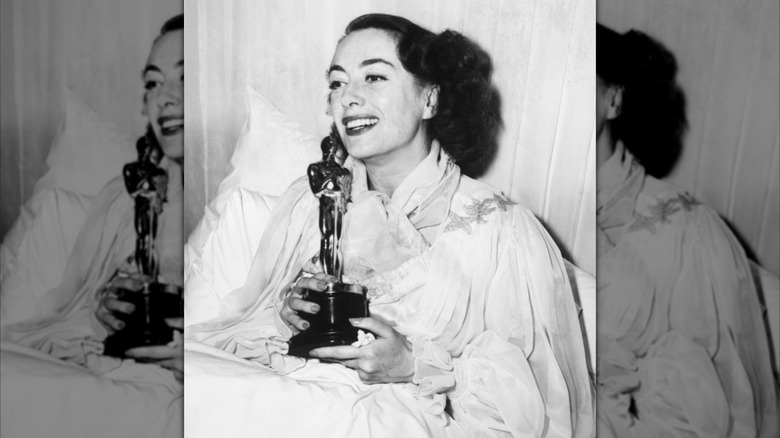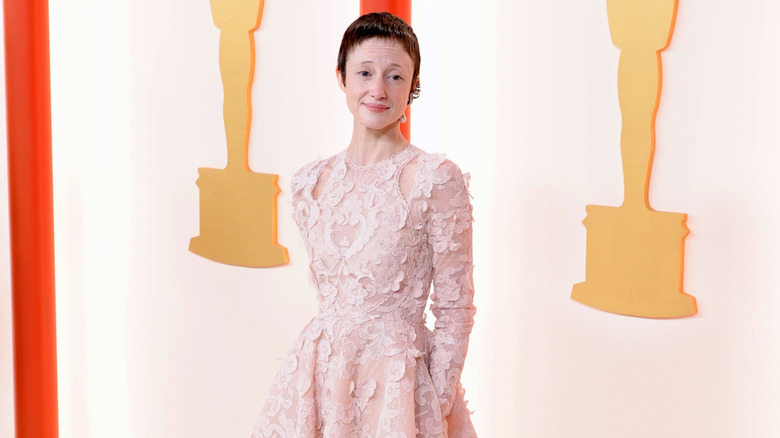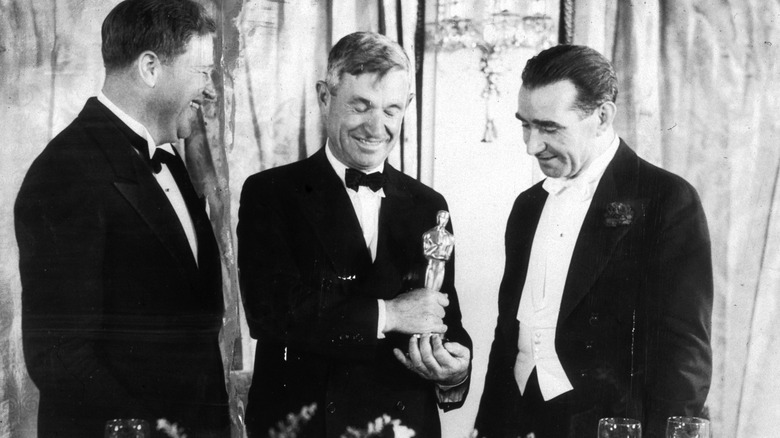The Most Controversial Moments In Oscars History
The Academy Awards have been around for nearly a century, churning out coveted honors for the best of the best in the film industry. But besides its longstanding status as the most prestigious awards night in cinema, the Oscars have also served as an enduring platform for some epic goof-ups, unforgettable political statements, and awkward moments that continue to evoke reactions years after they happened.
Given its massive reach and legacy, any extraordinary occurrence at the Oscars is bound to become a talking point — whether it's something as innocuous as a shared prize for Best Actress, or as scandalous as a star smacking another in the face. No matter the foundation of the controversy, high drama is all but guaranteed in a room full of creatives. The Oscars are after all, in legendary host Johnny Carson's words from 1979, "two hours of sparkling entertainment spread over a four-hour show." Here are the most controversial moments in Oscars history that the world never stopped talking about.
Richard Gere's 1993 speech got him banned from the Oscars
Richard Gere couldn't have guessed that his vocal support of the Tibetan political cause would earn him an unprecedented 20-year ban from the Oscars, when he used the awards stage as a platform to protest against the Chinese government in 1993. "I wonder if Deng Xiaoping is actually watching this right now ... with the knowledge that what a horrendous, horrendous human rights situation there is in China," Gere said, before presenting the Oscar for Art Direction. "Not only towards their own people, but to Tibet as well."
While Gere's impassioned speech won applause from his live audience, it apparently failed to impress producer Gil Cates, who fumed that he wouldn't invite the "Pretty Woman" star to a future show. However, over the next decade, when things seemed to have simmered down, Gere made his Oscars comeback in 2003. "Apparently, I've been rehabilitated. It seems if you stay around long enough, they forget they've banned you," he quipped to HuffPost.
Cher wore a dramatic revenge dress to the 1986 Oscars for not being nominated
At the 1986 Oscars, one wardrobe moment was so outrageous that it left a legacy of its own. Miffed at not having been nominated for her film "Mask" that year, Cher showed up in a daring outfit only she could have: a barely-there bra top, a low-waisted sequinned skirt, and an extravagant mohawk headdress to top off her dramatic all-black ensemble. As Cher's longtime designer Bob Mackie told naysayers at the time: "Of course it's not fashion. It's a crazy getup for attention" (via The New Yorker).
Cher, meanwhile, explained her iconic revenge dress as a symbol of protest against the Academy's alleged disapproval of her. "They hated the way I dressed and I had young boyfriends so they thought I wasn't serious. So I came out and said, 'As you can see I got my handbook on how to dress like a serious actress,'" she told Vogue. Maybe it was the revenge dress or her own acting chops that did the magic, but a year later, Cher ended up winning the Best Actress Oscar for "Moonstruck."
Tom Hanks was falsely accused of outing a gay man in his 1994 Oscars speech
After Tom Hanks won Best Actor for "Philadelphia" at the 1994 Oscars, he gave an acceptance speech that was as deeply moving as his momentous award-winning role as a gay lawyer battling AIDS and discrimination. "I would not be standing here if it weren't for two very important men in my life," Hanks said in his tearful tribute, naming his drama teacher Rawley Farnsworth as one of "the finest gay Americans" who inspired him.
Even as the speech garnered acclaim, it simultaneously accrued a false legacy that put blame on Hanks for outing a gay man in front of the whole world. The 1997 comedy film "In & Out," which was directly inspired by the controversy surrounding the speech, did little to exculpate Hanks. Contrary to wide belief, Hanks had contacted Farnsworth a few days before his Oscar win for permission to mention him in his speech. Farnsworth gave his consent, later telling People: "I thought, 'I've been retired for 12 years. What harm can it do?'"
Adrien Brody caught Halle Berry by surprise with an unplanned kiss on the Oscars stage
When Adrien Brody won the Oscar for Best Actor in 2003 for the biographical war drama "The Pianist," it seemed that the moment left him a little too overwhelmed. It was a historic win, no doubt, with Brody being the youngest actor at 29 to ever bag the coveted title — a record he has held unrivaled for over two decades. But whether or not it justified the unplanned smooch Brody landed on Halle Berry, who presented the award to him, is a bit of a gray area.
Brody later described the all too dramatic kiss as "probably one of the most memorable moments ever" to Vanity Fair, in what seemed like a rather dreamy recollection of time apparently slowing down for him. Berry, meanwhile, remembered the kiss rather differently. On Andy Cohen's "Watch What Happens Live" in 2017, Berry likened the infamous episode to an out-of-body experience that left her with just one emphatic thought: "What the f**k is happening?"
Marlon Brando declined his Best Actor Oscar for The Godfather
Marlon Brando winning the Best Actor Oscar for "The Godfather" was hardly a surprising milestone. The real shocker came when the acting legend turned the honor down. Not only did Brando pull a no-show at the 1973 event, he sent Native American activist and actor Sacheen Littlefeather in his place to explain his momentous absence. In a 60-second speech that made Oscars history — and invited some rather extreme reactions — Littlefeather began detailing "the treatment of American Indians today by the film industry and on television in movie reruns."
Many in the audience booed and attacked her with racist slurs, while film icon John Wayne allegedly turned violent listening to Littlefeather's speech — which was, by the way, only an abridged version of the eight-page outpouring Brando had originally sent to be read out. The New York Times later published Brando's speech in its entirety and Littlefeather, who was all but blacklisted from Hollywood after the 1973 Oscars, was issued an apology by the Academy nearly 50 years after her unforgettable protest.
The wrong Best Picture was announced at the 2017 Oscars
Among the most awkward Oscars moments caught on camera, the infamous Best Picture mix-up from 2017 takes a big slice of the cake — if not the whole cake itself. Warren Beatty and Faye Dunaway took to the stage to announce the final award for the night, which they said went to the Emma Stone and Ryan Gosling-starrer "La La Land" — except, it didn't. Turns out, Beatty and Dunaway had mistakenly read from the envelope that had just moments before declared Stone the Best Actress.
Unfortunately, the embarrassing blunder was only discovered after the "La La Land" team had begun delivering the ceremonial vote of thanks on stage. By the time producer Mark Platt took the mic, there was visible commotion in the background as the show's staff caught wind of the flub and came forward to examine the envelopes. Through the confusion, producer Jordan Horowitz finally broke the news: "There's a mistake. 'Moonlight,' you guys won Best Picture." And in answer to the one thought that doubtless weighed on every onlooker's mind, he clarified: "This is not a joke."
Robert Opel notoriously streaked across the Oscars stage in 1974
The notorious 1974 Oscars streaker is among the award show's most scandalous (and memorable) bits of lore. Just as actor David Niven was presenting the award for Best Picture that year, a man ran across the stage behind him buck naked, throwing up a peace sign before exiting in a flash. Amidst the commotion of the moment, Niven delivered an ever-iconic quip: "Isn't is fascinating to think that probably the only laugh that man will ever get in his life is by stripping off his clothes and showing his shortcomings?"
The streaker was identified as one Robert Opel — a photographer, artist, and gay activist — who had made his way past Oscars security with a press card to venture his daring piece of performance art. "It's one of those one-time things," he reportedly said backstage after his stunt (via Entertainment Weekly). Interestingly, instead of inviting penal action, the incident turned Opel into an overnight star and drew massive interest in his wild but tragically short life. Opel was shot dead in 1979 by burglars who broke into his gallery.
Angelina Jolie showered a little too much love on her brother at the Oscars
In 2000, Angelina Jolie marked a major career milestone by earning her first Oscar nomination for "Girl, Interrupted" and subsequently even clinching the award. But all over in the press, another equally (if not more) culturally significant moment dominated headlines. "I'm in shock and I'm so in love with my brother right now," Jolie said while accepting the Oscar for Best Supporting Actress, as her older brother James Haven sat watching from the audience. "He just held me and said he loved me and I know he's so happy for me."
What Jolie later justified as a harmless moment of sibling affection snowballed further into a near-scandal, when she shared a passionate kiss with Haven that same evening. The whole episode had just enough fuel to spark incest rumors across tabloids, which Jolie was not down with. She told Entertainment Weekly: "My parents really loved that moment, and that's what will always matter."
A simple hashtag exposed the lack of Oscars diversity
In early 2015, writer-activist April Reign sent a jolt through Hollywood with a wry but loaded post on X (formally known as Twitter) "#OscarsSoWhite they asked to touch my hair." It was a sharp response to the all-white list of acting nominees the Academy released that year and the hashtag quickly turned into a global movement against the Oscars' homogeneity. "It's about the underrepresentation of all marginalized groups," Reign told The New York Times.
The #OscarsSoWhite campaign was widely recognized as a significant turning point for representation and inclusion within the Academy, which eventually diversified its fraternity to include more women and people of color following Reign's remark and the furore it sparked. Reign meanwhile, became a prominent speaker for the cause — backed by Black directors like Ava DuVernay and Spike Lee — and in 2019, marked a full circle moment with an invite to the Oscars.
Barbra Streisand and Katharine Hepburn tied for the Best Actress Oscar in 1969
The Academy is not particularly known for being indecisive. But 1968 was a year of such smashing performances that votes were divided for Best Actress at the 1969 Oscars. In a history-making event at the awards that year, Hollywood legends Katharine Hepburn and Barbra Streisand shared the top honor — for "The Lion in Winter" and "Funny Girl" respectively. The look of disbelief that flashed across presenter Ingrid Bergman's face while announcing the winners embodied the persisting shock of the moment.
While the 1969 Best Actress tie marked Streisand's first ever Oscar recognition, it was one of Hepburn's last in a line of record nominations and wins. Incidentally, in the absence of 61-year-old Hepburn — whose award was picked up by director Anthony Harvey — debutante Streisand got to revel in her spotlight moment, memorably greeting her Oscar statuette with a nod to her iconic first line from "Funny Girl": "Hello, gorgeous."
Will Smith slapped Chris Rock at the Oscars for joking about his wife
When Will Smith smacked host Chris Rock hard across his face at the 2022 Oscars, it was difficult to decipher whether or not the moment was scripted. The violent outburst seemed all too shocking to be true. But it apparently was. The joke Rock made about Smith's wife Jada Pinkett Smith, who lives with alopecia — "Jada, can't wait for 'G.I. Jane 2'" — did not fare well with the actor, who infamously warned the comedian to keep his wife's name "out of his f***ing mouth."
Though Smith went on to win the Best Actor award for "King Richard" later that night, all anyone could talk about was the slap. Its consequences were manifold. Smith issued multiple apologies and resigned from the Academy of Motion Picture Arts and Sciences, which subsequently placed a 10-year ban on him, barring him from all Academy events, including the Oscars. Addressing the drama a year later on Netflix's "Selective Outrage," Rock said: "It still hurts ... But I'm not a victim, baby."
Joan Crawford accepted her Oscar from bed in 1946
Joan Crawford's life and career remained a subject of interest throughout the Golden Age of Hollywood — and the legendary actor actively made sure of it. In 1946, she pulled a stunt no star then or since would dare to venture, by accepting her Oscar for Best Actress from the comfort of her bedroom. Crawford was apparently down with a flu at the time, although in a confession many years later, she also admitted to a fear of losing her award to fellow Best Actress contender Ingrid Bergman.
Crawford's win for "Mildred Pierce" was momentous not simply for her dramatic acceptance of the honor, but also because it marked her comeback to stardom after a period of notoriously being dubbed "box office poison." Crawford told reporters at the time: "Whether the Academy voters were giving the Oscar to me, sentimentally, for 'Mildred' or for 200 years of effort, the hell with it — I deserved it." The statuette became so iconic that it sold for a whopping $426,732 at an auction in 2012.
Lady Gaga and Bradley Cooper's intimate Oscars performance fueled affair rumors
Lady Gaga and Bradley Cooper's sizzling chemistry in "A Star Is Born" blew fans and critics away when the musical released in 2018 — so much so that it sparked rumors of an on-set affair. When the stars took their romance off-screen and brought it to the Oscars stage in 2019 for a performance of their award-winning duet "Shallow," that speculation boiled over with full force. The production, the setting, the coming of their faces suggestively close together — everything dripped with passion that seemed all too real.
The internet, of course, went bananas and the steamy Gaga-Cooper duet came away as the unrivaled highlight of the 2019 Oscars. To viewers awestruck by the heat of the performance, the idea that Gaga and Cooper's partnership was only platonic seemed implausible. But according to Cooper, who also directed the film, that was the whole truth. "They kind of fall in love in that scene in the film," he told The Hollywood Reporter, explaining that the Oscars performance was set up to resemble the moment in "A Star Is Born."
Susan Sarandon went off-script at the 1993 Oscars and earned a ban
Richard Gere wasn't the only big star to stir up controversy at the 1993 Academy Awards. Three-time Oscar nominee Susan Sarandon was also a notable contributor to the political turn the show took that year, by using the podium to rally for the cause of HIV/AIDS. "We would like to ask our governing officials in Washington to admit that HIV is not a crime," Sarandon said while presenting the Oscar for Best Editing, alongside her then-partner Tim Robbins.
Her call for justice was in reference to the Haitian refugee crisis, during which hundreds of HIV-positive Haitians were detained at Guantanamo Bay. Though AIDS awareness was a popular theme that evening — with everyone from Sarandon to Gere, and a spate of other celebrities sporting the movement's symbolic red ribbon — Oscars producer Gil Cates didn't enjoy Sarandon and Robbins' on-stage improvisation, slamming celebrities' use of his platform to propagate their political beliefs as "distasteful and dishonest" (via Los Angeles Times).
Andrea Riseborough's surprise Oscar nomination raised some eyebrows
After its release in 2022, Andrea Riseborough's "To Leslie" was snubbed across major award shows, from the Golden Globes to the Critics Choice Awards. So when the unsung indie film earned her a gold-dusted Best Actress nomination at the Oscars, it naturally raised some questions. A grassroots campaign was reportedly initiated by the "To Leslie" team, which led to massive endorsement for the film on social media backed by Hollywood heavy hitters like Edward Norton, Gwyneth Paltrow, and Amy Adams.
The surge in support for Riseborough's film, directed by Michael Morris, was deemed unusual — especially in light of Academy regulations that prohibit lobbying for any specific contender. As the "To Leslie" controversy brewed ahead of the 2023 Oscars, the Academy issued a statement saying it would be "conducting a review of the campaign procedures around this year's nominees." While Riseborough's nomination was eventually not revoked, she told The Hollywood Reporter: "The film industry is abhorrently unequal in terms of opportunity."
The wrong Frank walked up to accept the Best Director award at the 1934 Oscars
One of the most embarrassing gaffes to ever occur at the Oscars dates back to 1934 — thankfully, decades before the award ceremony began reaching millions on television. Actor-comedian Will Rogers, who was hosting the sixth edition of the show, presented the Oscar for Best Director with a seemingly uncomplicated announcement: "It couldn't happen to a nicer guy. C'mon up and get it, Frank!" Except, there were two Franks nominated in the category that night.
The award had actually gone to Frank Lloyd for "Cavalcade." But in what can be construed as an honest mistake, "Lady for a Day" director Frank Capra got up and made his way to accept the honor. It wasn't until the spotlight found Lloyd that Capra caught wind of the goof-up. "That walk back — through applauding V.I.P.s yelling 'Sit down! Down in the front! Sit down!' as I obstructed their view — was the longest, saddest, most shattering walk in my life," Capra later recalled in his autobiography.
